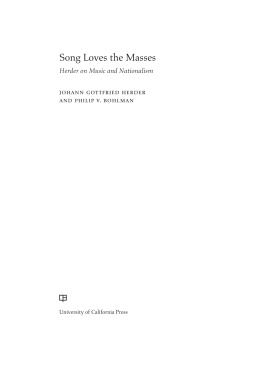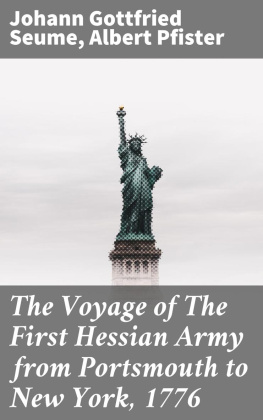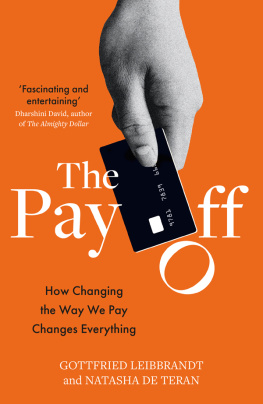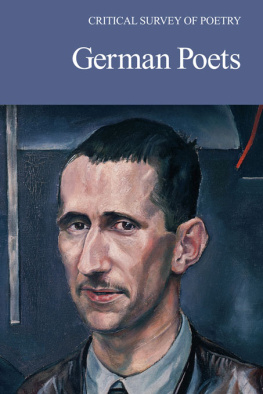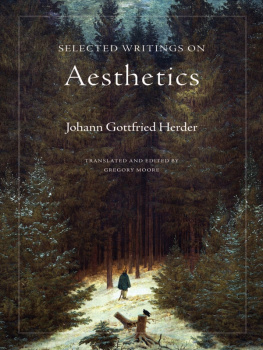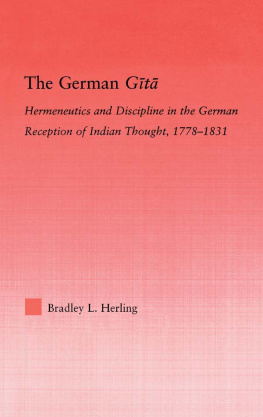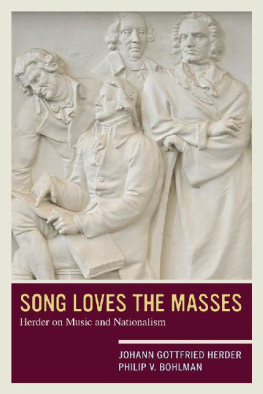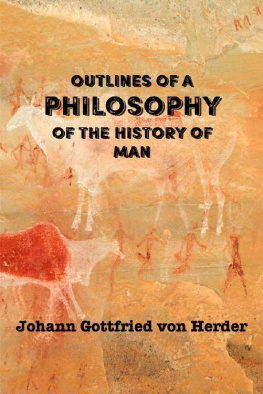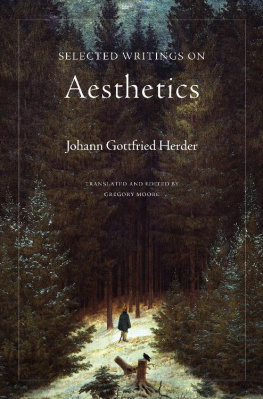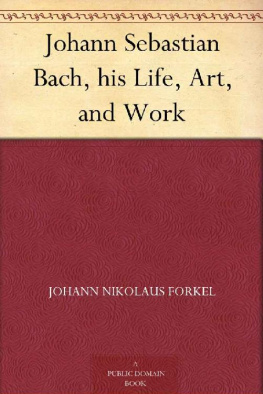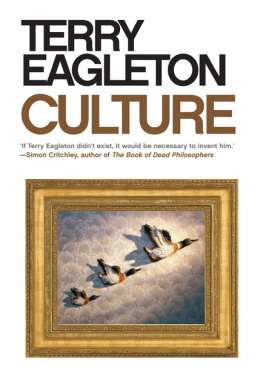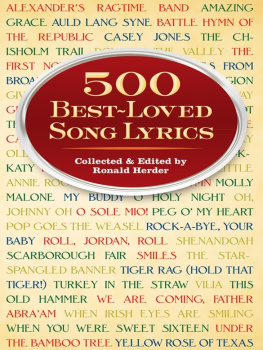Herder Johann Gottfried - Song Loves the Masses
Here you can read online Herder Johann Gottfried - Song Loves the Masses full text of the book (entire story) in english for free. Download pdf and epub, get meaning, cover and reviews about this ebook. publisher: University of California Press, genre: Religion. Description of the work, (preface) as well as reviews are available. Best literature library LitArk.com created for fans of good reading and offers a wide selection of genres:
Romance novel
Science fiction
Adventure
Detective
Science
History
Home and family
Prose
Art
Politics
Computer
Non-fiction
Religion
Business
Children
Humor
Choose a favorite category and find really read worthwhile books. Enjoy immersion in the world of imagination, feel the emotions of the characters or learn something new for yourself, make an fascinating discovery.
- Book:Song Loves the Masses
- Author:
- Publisher:University of California Press
- Genre:
- Rating:3 / 5
- Favourites:Add to favourites
- Your mark:
- 60
- 1
- 2
- 3
- 4
- 5
Song Loves the Masses: summary, description and annotation
We offer to read an annotation, description, summary or preface (depends on what the author of the book "Song Loves the Masses" wrote himself). If you haven't found the necessary information about the book — write in the comments, we will try to find it.
Song Loves the Masses — read online for free the complete book (whole text) full work
Below is the text of the book, divided by pages. System saving the place of the last page read, allows you to conveniently read the book "Song Loves the Masses" online for free, without having to search again every time where you left off. Put a bookmark, and you can go to the page where you finished reading at any time.
Font size:
Interval:
Bookmark:

The publisher gratefully acknowledges the John Daverio Endowment of the American Musicological Society, funded in part by the National Endowment for the Humanities and the Andrew W. Mellon Foundation.
The publisher also gratefully acknowledges the generous support of the Music in America Endowment Fund of the University of California Press Foundation, which was established by a major gift from Sukey and Gil Garcetti, Michael P. Roth, and the Roth Family Foundation.
JOHANN GOTTFRIED HERDER AND PHILIP V. BOHLMAN

UNIVERSITY OF CALIFORNIA PRESS
University of California Press, one of the most distinguished university presses in the United States, enriches lives around the world by advancing scholarship in the humanities, social sciences, and natural sciences. Its activities are supported by the UC Press Foundation and by philanthropic contributions from individuals and institutions. For more information, visit www.ucpress.edu.
University of California Press
Oakland, California
2017 by The Regents of the University of California
Library of Congress Cataloging-in-Publication Data
Names: Herder, Johann Gottfried, 17441803, author. | Bohlman, Philip V., 1952- editor, translator, writer of added commentary. | Container of (expression): Herder, Johann Gottfried, 17441803. Alte Volkslieder. English.
Title: Song loves the masses : Herder on music and nationalism / Johann Gottfried Herder and Philip V. Bohlman.
Description: Oakland, California : University of California Press, [2017] | Includes bibliographical references and index.
Identifiers: LCCN 2016026829 (print) | LCCN 2016032212 (ebook) | ISBN 9780520234949 (cloth : alk. paper) | ISBN 0520234944 (cloth : alk. paper) | ISBN 9780520234956 (pbk. : alk. paper) | ISBN 0520234952 (pbk. : alk. paper) | ISBN 9780520966444 (ebook)
Subjects: LCSH : Folk songsHistory and criticism. | Nationalism in music. | National characteristics. | Herder, Johann Gottfried, 17441803Criticism and interpretation.
Classification: LCC ML 3545 . H 47 2017 (print) | LCC ML 3545 (ebook) | DDC 781.5/99dc23
LC record available at https://lccn.loc.gov/2016026829
Manufactured in the United States of America
26 25 24 23 22 21 20 19 18 17
10 9 8 7 6 5 4 3 2 1
for Andrea and Ben
whose life journeys overflow with the
songs we together share
Gott, la uns dein Heil schauen,
Auf nichts Vergnglichs trauen,
Nicht Eitelkeit uns freun!
La uns einfltig werden,
Und vor dir hier auf Erden
Wie Kinder fromm und frlich seyn.
MATTHIAS CLAUDIUS , Abendlied
Final folk song in Johann Gottfried Herder, Volkslieder
Herder was there in the moment I realized my life journey would be that of an ethnomusicologist. Fall 1976, the University of Illinois at Urbana-Champaign, Music 317, Folk Music. Bruno Nettls introductory course was at once new, even exotic, as my first course in ethnomusicology, and familiar, even intimate, as a moment of recognition, Erkenntnis. I had not known that I had lived with folk music all my life, but it became clear the moment I recognized the sounds of worlds close to home and far away. Herder was there because he had given all this a name, Volkslied , folk song. It, too, had always been there, just not called folk song. Herders folk songs, too, were intimate and exotic, but in that moment of recognition they cohabited the worlds of self and other. In that moment, captured in Herders folk songs, music changed for me. It is that moment that I attempt to capture in this book.
Herder has accompanied me on an intellectual journey of almost forty years. Beginning with ethnographic studies of the familiarfolk music in my home state of Wisconsin, which led to collections that would become the substance of my masters thesis and first publicationsI traveled with Herder farther and farther into worlds that were unknown to me, to Israel and the Middle East, to the folk song landscapes of Eastern Europe, to India and beyond. If he began with folk song, Herder himself journeyed to the far shores on which it provided the ontological energy and ethnographic agency that made music far more than itself.
I have had important guides during these travels with Herder, and I acknowledge them with gratitude. Bruno Nettl first pointed me to Herder, and in one of the most recent papers that contained ideas I use in this book, the 2014 Bruno and Wanda Nettl Distinguished Lecture in Ethnomusicology at the University of Illinois, I was able to sustain the level of my indebtedness. Over many years, my teachers and colleagues in ethnomusicology encouraged (or, more commonly, tolerated) my interests in folk music. Most of all, I was never dissuaded from recognizing that folk music was always there, be it in the anthologies and collections of Jewish folk songs that I was able to plumb at the Jewish Music Research Centre at the National and University Library of Israel, or in the Deutsches Volksliedarchiv in Freiburg im Breisgau. During those early years after my graduate studies, I benefited enormously from the guidance and wisdom of Israel Adler and Amnon Shiloah in Jerusalem, Rudolf Pietsch in Vienna, and Otto Holzapfel in Freiburg. Otto, especially, knew that folk song was always there, and in different ways, so too would he be as I expanded the musical seas across which I journeyed, not least those whose shores were recognizable through religion. I am particularly thankful that Otto continues to be a fellow traveler.
Several fellowships over the course of the past forty years have allowed me to return to Herder and the worlds of folk song and folk music that his writing and thought made recognizable. Among the most important were a Fulbright-Hays Dissertation Research Fellowship to Israel (198182); an Alexander von Humboldt Research Fellowship in Germany (199091); a Fulbright Guest Professorship at the University of Vienna (199596); a senior fellowship at the Internationales Forschungszentrum Kulturwissenschaften in Vienna (1999); and a Berlin Prize Fellowship at the American Academy of Berlin (2003), during which I began the translations that would come to fill the pages of this book. I am very grateful indeed for such support for my research.
Herderian topics were relatively rare in my teaching, but they were particularly important in the ways they punctuated my pedagogy. In 1984, at the University of California, Berkeley, Alan Dundes asked that I teach a course on folk music, which became the point of departure for many discussions on Herder for the two of us over many years, beginning with my first book, The Study of Folk Music in the Modern World (1988), which Alan commissioned, and leading in 2006 to one of the lectures that would draw my thoughts on Herder together for the present book, which I delivered at Berkeley in Alans memory. During guest professorships in Freiburg im Breisgau, Vienna, and Berlin, folk music came to occupy entire seminars or substantial modules, which in turn led me to the other Herderian subject of this book, nationalism. For its generous support of this publication I thank the Music in America Endowment at the University of California Press; I also received an AMS Publication Grant from the John Devario Endowment of the American Musicological Society. The confluence of music and nationalism in my work has been grounded in Europe, but increasingly moves to more global shores and beyond the present. I am particularly grateful to the John Simon Guggenheim Memorial Foundation for a fellowship that now leads me through the present Herder project to the study on music after nationalism upon which I now embark.
Font size:
Interval:
Bookmark:
Similar books «Song Loves the Masses»
Look at similar books to Song Loves the Masses. We have selected literature similar in name and meaning in the hope of providing readers with more options to find new, interesting, not yet read works.
Discussion, reviews of the book Song Loves the Masses and just readers' own opinions. Leave your comments, write what you think about the work, its meaning or the main characters. Specify what exactly you liked and what you didn't like, and why you think so.

